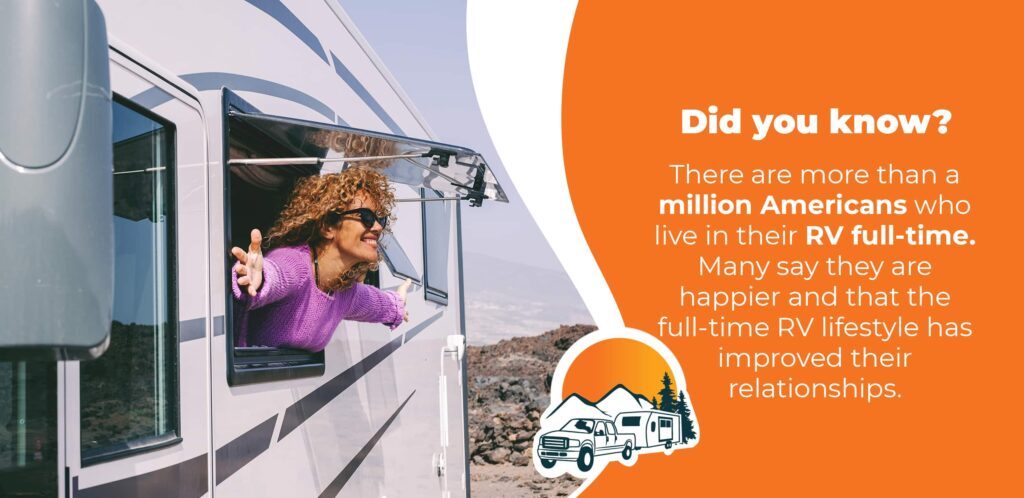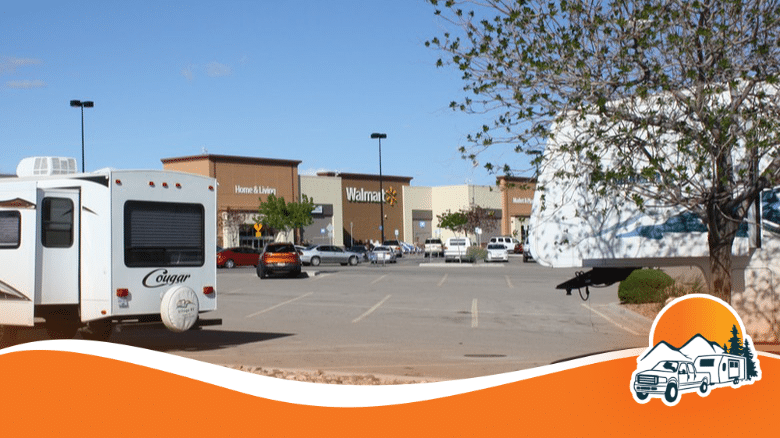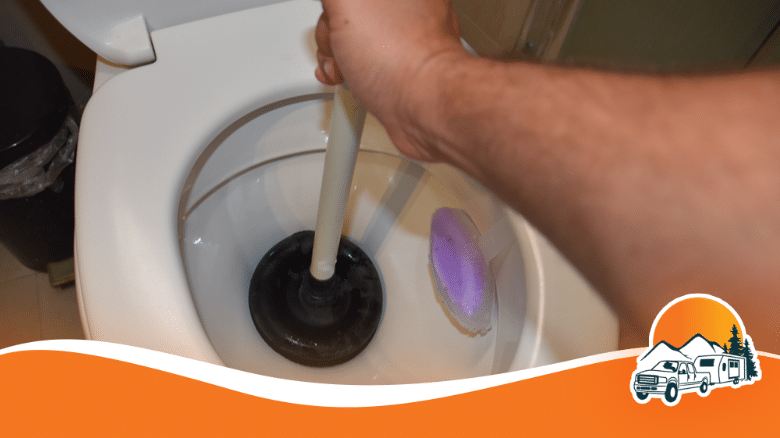The dream of full-time RV life is a little like the dream of quitting your job and going on a road trip. While it seems incredibly appealing, you’re unsure if you could actually do it. It’s alluring, but the logistics are a little scary.

However, that’s where we come in! This guide will help you figure out how much it would cost to live in an RV full time and whether you can make it work for your lifestyle.
Major Cost for RV Living Full Time
Many expenses go into full-time RV living, and it can be easy to get overwhelmed by the numbers when you start planning your move. You should create an RV budgeting calculator to get an idea of the total monthly budget.
Here are some of the most common expenses you’ll have when living in an RV:
Insurance
Most people worry about insurance when thinking about full-time Rving, and that’s because it is a major expense.
Insurance for your RV can be as cheap as $100 or as expensive as $1200 a year, depending on what kind of coverage you need and what type of vehicle you have.
Gasoline
Gas is a significant expense for full-time RVers, but it can be reduced by careful planning — using propane and electricity instead of gasoline, and driving at night when possible.
The average cost per mile for an RV is about $0.21 per mile (or $0.09 per km), but that can vary depending on your driving habits and how much you use amenities like air conditioning, which can increase fuel consumption.

Campsite Fees
This includes both the cost of renting the site and any utilities you may use in conjunction with the site (such as water and electricity).
Campsite fees depend on where you are staying. If you want to stay at some fancy parks, then, of course, you’ll have to pay greater than, say, staying at Boondocking.
Here are some of the main camping site options:
RV Parks
RV parks are a great option if you have kids or pets because they have pools and playgrounds, on-site laundry facilities, and Wi-Fi access. But they can be pricey since they typically charge by the night or week instead of by the month like some other types of campgrounds do. The average monthly rate at an RV park is $500 -$700 per month.
State Park Campgrounds
Most national and state parks have campsites available for RVs.
The price depends on location and seasonality, but generally, these sites are less expensive than RV parks and cost around $20-40 per night because they lack amenities such as hookups or dump stations.
However, some do offer basic bathrooms & showers, which can be a big help if you don’t have an onboard shower yet.
Boondocking
Boondocking is one way to avoid paying campsite fees altogether. Boondocking means camping without hookups, including water, power, and sewer, at a chosen location away from established campsites.
Boondocking is legal on public lands in all 50 states (as long as it doesn’t interfere with other activities).
However, boondocking can be challenging because there’s no guarantee of finding an appropriate spot when needed or being able to move around freely within the area due to local regulations.
Also, boondocking may not be permitted on private property (even if it’s just for overnight parking).
Food
When living full-time in a recreational vehicle, you must get creative with your food budget. One of the most significant expenses for full-time RVers is food.
The cost of food varies significantly depending on where you live and what type of food you like to eat. For example, if you’re in the western part of the country and like fresh fruits and vegetables, that will increase your monthly food budget significantly.
If you’re traveling through Texas or New Mexico and want to enjoy some BBQ ribs once in a while, that will also increase your bill considerably.
On average, most people spend between $500-$1,000 per month on groceries while living in an RV or motorhome.
Repair and Maintenance
Repairs can be costly, especially for older RVs. Repairs can range anywhere from $150 to $1,000, depending on the problem and its seriousness.
Something that shouldn’t be overlooked is tires. Tires are essential for your RV because they allow you to move around safely. An average tire will run you about $250 each, so if one blows out on the road, expect to pay more than $1,000 in total costs just for the replacement!
Propane Refills
Propane is used by many RVs to power their appliances and heaters. Full-time RVers must refill their tanks every few months depending on how often they use them (and how much). The cost of propane ranges from $20 per tank each month.
Phone and Internet Utilities
When you live in an RV full time, you must have internet access and a phone. And if you’re like most people, you probably use it for work and personal use. AT&T provides a hotspot with unlimited data for around $105 monthly.
Entertainment
The entertainment category is probably the most expensive part of RV living because it includes movies and concert tickets. If you want to go out for something fun every night, expect to spend about $250 per month on this category alone.
Health Insurance
Health insurance is one of the most important factors when planning your RV full-time lifestyle. Getting insured may be difficult or impossible if you have a pre-existing condition. If you plan to travel with your family, you want to ensure everyone is covered.
The prices vary depending on what type of coverage and where you live, but we have seen quotes for about $300 per month for a family of four.
Laundry
It may seem like a small expense, but doing laundry is expensive when you live in an RV. An average load of laundry costs about 40 to 50 cents, but if you have to dry it in your dryer, be prepared for an additional $20 or so per load.
The TRUE Cost of Full Time RV Living (SURPRISINGLY CHEAP)
Total Cost of Living RV Full Time
Once you total all the major expenses, the estimated total monthly cost is around $3,000 per month.
The total cost of living in an RV full-time depends on many factors. The biggest factor is what you decide to do with your RV. If you want to live in it full time, you must plan on paying for all the expenses accompanying that lifestyle.
If you live in your RV part-time and still have a house, you will only have some expenses.
How Much Does It Cost to Rent an RV?
The answer depends on many factors, but size and amenities are the most important. A basic RV will cost between $50 and $75 per day if you’re looking for a small campervan without air conditioning. If you want something bigger with more amenities, expect to pay $100 or more per day.
RV rentals typically come either in a trailer or a complete vehicle, including everything you need for travel: sleeping quarters, kitchen appliances, and storage compartments. Some companies allow travelers to upgrade their trailers or vans with optional add-ons like televisions and DVD players.
Conclusion
So there you have it: the low-down, the enchilada, and everything in between.
There’s no doubt that RVing is an experience like no other, a unique opportunity to see the world in a different light. It’s also a great way to save money on your travels, which is always good news for travelers looking for new ways to save costs.
So if you’re ready to hit the road, we say go for it! Make sure you’ve saved enough money to cover all those unexpected expenses.
FAQs
How much does an RV cost to rent?
You can expect to pay around $100 per day or more for a full-size RV, depending on how long you intend to rent it.
How much does it cost to live at a campground?
The average cost of a campground is $20-50 per night, but you might pay more or less, depending on the amenities offered by your campground.
How much do RV parks cost per month?
RV parks are anywhere from $350 to $500 per month. However, it depends on where you are and what kind of park you’re looking at,
What is a reasonable budget for full-time RV living?
A reasonable budget for full-time RV living is about $1000 per month. This includes housing, food, and general expenses.
Is living in an RV worth it?
Yes! It’s a great way to save money and be close to nature. You don’t need to live in an RV, but you can easily rent one for the weekend or even longer.







